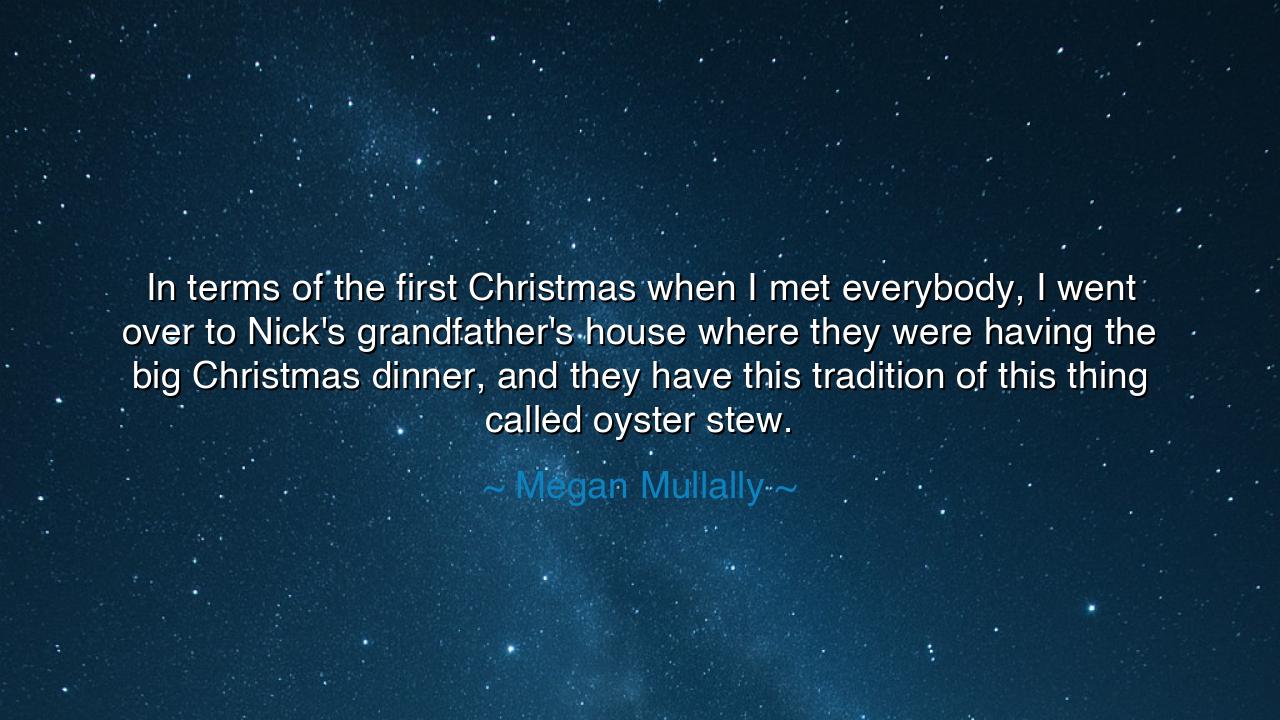
In terms of the first Christmas when I met everybody, I went over
In terms of the first Christmas when I met everybody, I went over to Nick's grandfather's house where they were having the big Christmas dinner, and they have this tradition of this thing called oyster stew.






Host: The evening was dressed in gold light and soft laughter. The kitchen was alive — the kind of chaos that only happens when family collides with tradition. Steam rose from a large pot on the stove, carrying the smell of butter, cream, and brine. Christmas music — something old-fashioned and a little scratchy — played from a radio on the counter.
The house was warm, almost too warm, and outside, snow fell against the windows, thick, slow, and silent.
At the edge of the table, Jack sat, his hands wrapped around a mug of coffee, his face half lit by the fireplace. He looked out of place, like someone who’d walked into a painting of someone else’s life. Across from him, Jeeny was helping Nick’s grandfather stir the oyster stew, her cheeks flushed, her hair pulled back, her smile the kind that belonged in a place like this.
Host: The room felt like a memory — one that hadn’t happened yet, but already hurt with nostalgia.
Jeeny: “Megan Mullally once said, ‘In terms of the first Christmas when I met everybody, I went over to Nick’s grandfather's house where they were having the big Christmas dinner, and they have this tradition of this thing called oyster stew.’”
She laughed, her voice bright like a bell. “I always loved that story. It’s so... awkwardly human, you know? That first Christmas, trying to fit in, pretending to love something you’ve never even tasted.”
Jack: “Yeah, it’s funny. Until you realize it’s about ritual — not the taste.”
He took a sip of his coffee, watching the steam drift between them. “Oyster stew... It’s not about the oysters, Jeeny. It’s about belonging. About trying to step into someone else’s story and not drown in it.”
Jeeny: “But that’s the whole beauty of it. You do it anyway. You stir the stew, you laugh at the wrong joke, you smile, even if you feel like a stranger. That’s how families grow — through those clumsy, warm-hearted moments.”
Host: The fire crackled, a log collapsing into embers. The room glowed — a mosaic of faces, colors, and motion. The smell of oysters mixed with pine and cinnamon, a strange harmony that somehow worked.
Jack: “You talk like tradition is always a welcome mat. But sometimes, it’s a fence. Sometimes those rituals just remind you that you’re not part of it.”
Jeeny: “Maybe. But it depends on whether you’re watching or participating. There’s a difference.”
Jack: “You really think you can just join in and everything changes?”
Jeeny: “Not everything. But the moment you share something — even a bowl of weird, milky oyster soup — you’re already changing it. That’s the secret of tradition. It adapts.”
Host: A pause hung between them, the kind that feels like it might last forever. Outside, the snow thickened, the streetlights glowing in the white haze. Inside, voices from the living room — the laughter, the stories — drifted in and out like a chorus of ghosts.
Jack: “You sound like you think every awkward dinner is some kind of miracle.”
Jeeny: “Maybe it is. Miracles don’t always glow, Jack. Sometimes they taste like oysters and awkwardness.”
Jack: “You ever notice how every family thinks their traditions are sacred? As if their rituals are what define love. I don’t buy it.”
Jeeny: “Then what does define it?”
Jack: “Choice. Showing up even when you don’t belong. Sitting through a dinner that doesn’t make sense, not because you love the food, but because you love the person.”
Jeeny: “That’s exactly what I’m saying.”
Host: She smiled, softly, and for a moment, they both laughed — not because anything was funny, but because something had broken open between them.
The grandfather called from the stove, holding a ladle like a priest at altar.
“Alright, kids! Come taste the stew!”
Jeeny walked over, her steps light, her eyes bright. Jack followed, slower, as if he were approaching some sacred ritual he didn’t yet understand.
Host: The bowl was passed to him — hot, creamy, unfamiliar. He looked down, then up, at a dozen expectant faces, all waiting. For a moment, he hesitated. Then he took a spoonful.
The taste was odd — salty, strange, comforting, and sad, all at once. It was home, but not his.
Jack: “It’s... good.”
Jeeny: “You’re lying.”
Jack: “Yeah. But maybe that’s part of the tradition, too.”
Host: The room erupted in laughter, a wave of sound and warmth that filled the walls. The moment was messy, human, perfectly imperfect — exactly what love looks like when it stops trying to be beautiful.
Jeeny: “You see? It’s not about the stew. It’s about the story you’ll tell next Christmas.”
Jack: “And the one after that.”
Host: The firelight flickered across their faces, and in that flicker, you could see it — the shift, the belonging, the soft acceptance that only comes when someone finally decides to stay.
The grandfather raised his glass, his voice booming through the room:
“To tradition — even the ones we invent as we go!”
Everyone cheered. The snow kept falling. The world outside was cold, but inside the kitchen, warmth held its ground.
Host: And in that laughter, in the clinking of spoons and the echo of voices, Jack finally understood — that belonging isn’t something you’re given. It’s something you taste, one awkward spoonful at a time.






AAdministratorAdministrator
Welcome, honored guests. Please leave a comment, we will respond soon